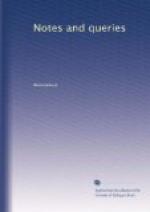See also Nouv. Diction. Historique in the account of Gratius, O.
There is also a good article on these letters in a very excellent work entitled Analectabiblion, or Extraits Critique de divers Livres rares, &c., tirez du Cabinet du Marq. D. R. (oure). Paris, 1836. 2 tomes 8vo.
F.R.A.
Epistolae Obscurorum Virorum.—The article inquired for by H.B.C. (Vol. ii, p. 55) is probably one in the Edinburgh Review, vol. liii. p. 180., attributed to Sir William Hamilton, the distinguished Professor of Logic in the university of Edinburgh.
CH.
* * * * *
CAXTON’S PRINTING-OFFICE.
(Vol. ii., p. 99.)
Mr. Rimbault is wrong in giving to Abbot Milling the honour of being the patron of Caxton, which is due to Abbot Esteney. Mr. C. Knight in his Life of Caxton, which appropriately formed the first work of his series of Weekly Volumes, has the following remarks upon the passage from Stow, quoted by Mr. Rimbault:
“The careful historians of London here committed one error; John Islip did not become abbot of Westminster till 1500. John Esteney was made abbot in 1474, and remained such until his death in 1498. His predecessor was Thomas Milling. In Dugdale’s Monasticon we find, speaking of Esteney, ’It was in this abbot’s time, and not in that of Milling, or in that of Abbot Islip, that Caxton exercised the art of printing at Westminster.’”—p. 140. #/
I have no work at hand to which I can refer for the date of Milling’s death, but if 1492 be correct, perhaps he may have been promoted to a bishoprick.
With reference to Mr. Rimbault’s remark, that Caxton first mentions the place of his printing in 1477, so that he must have printed some time without informing us where, I may be allowed to observe that it seems highly probable he printed, and indeed learned the art, at Cologne. At the end of the third book of his translation of the Recuyell of the Historyes of Troye, Caxton says:
“Thus end I this book which I have translated after mine author, as nigh as God hath given me cunning, to whom be given the laud and praises ... I have practised and learned, at my great charge and dispense, to ordain this said book in print, after the manner and form as you may here see."{123}
And on the title-page he informs us:
“Whyche sayd translacion
and werke was begonne in Brugis in
1468, and ended in the holy
cyte of Colen, 19 Sept. 1471.”




